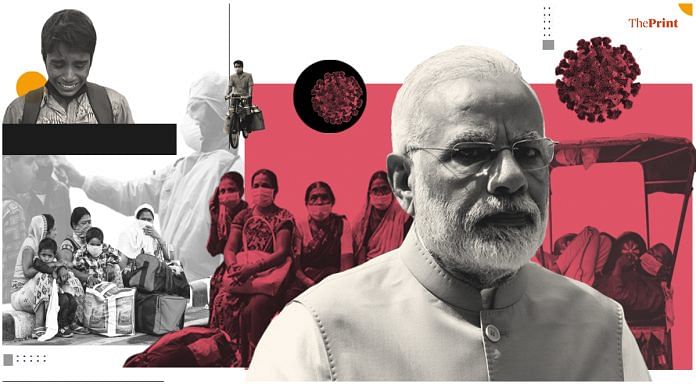Finance Minister Nirmala Sitharaman has announced a three-month relief package worth Rs 1.7 lakh crore for India’s urban and rural poor to tackle the coronavirus lockdown. The package includes Pradhan Mantri Gareeb Kalyan Anna Yojana, Rs 50 lakh insurance cover for health workers, free LPG for BPL families, wage increase of Rs 20 per day for MGNREGS workers and Rs 500 per month for Jan Dhan account holders
ThePrint asks: Modi govt’s Gareeb Kalyan: Does India have the ability to deliver amid Covid-19 lockdown?
Govt package will not save millions of small businesses that might close because they do not have holding capacity
 Gurcharan Das
Gurcharan Das
Author & former CEO of Procter & Gamble India
India’s Achilles heel is its state capacity and it is natural to ask if the nation can deliver Finance Minister Nirmala Sitharaman’s bold coronavirus humanitarian package. There are two points of delivery required – PDS outlets and bank accounts (especially Jan Dhan accounts).
The PDS is a running system and in recent years, Aadhaar has dramatically cut down leakages, making it more efficient. So, this is not going to be an issue. More than 90 per cent of India’s households now have bank accounts and so, the promised cash transfers to farmers and workers impacted by lockdown, MGNREGS workers, Pradhan Mantri Ujjwala Yojana beneficiaries, EPF, and medical insurance beneficiaries can be done through their bank accounts. The question is what about the pakora-walla and his four or five employees who don’t have Jan Dhan accounts? And what about people in the remote areas of northeastern states and some Odisha districts who are also without banking facilities?
More importantly, this package will not save millions of small businesses that might close because they do not have holding capacity. To tackle this, Sitharaman must devise a small business relief programme. For small businesses, this is the third shock after demonetisation and GST, and the they are hugely vulnerable and must be protected.
Relief package reflects a sense of realism but suggests an insensitivity to macroeconomic processes
 Narendar Pani
Narendar Pani
Professor and Dean, School of Social Sciences, NIAS
Finance Minister Nirmala Sitharaman’s relief package for the poor in the midst of the Covid-19 crisis reflects a sense of realism as far as its immediate financial implications are concerned, though it continues to suggest insensitivity to macroeconomic processes.
At Rs 1.7 lakh crore the initiative is a major one, especially during an economic slowdown. What makes it feasible is the willingness to tap into resources that will not hurt the deficit. The major thrust of the package, its food component, will only make use of the existing stocks with the Food Corporation of India. Since this unsold stock is already a part of the food subsidy, giving a major part of it to poor households will not hurt the budget in any way. The same would be true of some other measures like the payments to farmers, which are only likely to be an instalment of the existing scheme.
What the government has, typically, chosen to ignore is the macroeconomic implications of the move. What will the huge increase in the supply of rice, wheat and pulses do to the open market prices of these commodities? If they do lead to a crash in market prices, the farmers growing these crops would lose much more than the handouts that have been promised. The deadly economic impact of the coronavirus will then last much longer than the three months anticipated by the finance minister.
Govt could have released pending dues to MGNREGS workers instead of announcing a wage increase from April
 Avani Kapur
Avani Kapur
Director, Accountability Initiative and Fellow, Centre for Policy Research
The announcement of Rs 1.7 lakh crore social security package is an essential first step and addresses some immediate needs such as the provision of health insurance to frontline workers, free gas, double entitlements of food grains and pulses for the next three months.
But there are some obvious misses. One of these is the announcement of Rs 5,600 crore for a daily wage increase of MGNREGS workers starting April — from Rs 182 to Rs 202. Notified wage rates increase annually in any case but more importantly, given that most MGNREGS work has come to a standstill, this allocation holds little meaning. Instead, the government could have focussed on clearing the pending payments. As of today, there are Rs 1,857 crore wages pending under the scheme besides the unemployment allowance. The focus could have been on ensuring pending wages, and additional missed wages reach the bank accounts of registered workers during the lockdown period.
Similarly, 24 per cent of monthly wages into PF accounts of organised wage earners earning below Rs 15,000 per month for the next three months does not address current cash needs nor provides a minimum basic income to help tide over these rough times. Provisions for women, senior citizens, persons with disability and the neglected informal sector also remain inadequate. With many provisions confined to the month of April, we should expect another package. Hope it is done soon and addresses some of these concerns.
With no nationwide portable ration cards, migrant workers will be left out of food scheme
 Himanshu
Himanshu
Associate professor of Economics, JNU
The question is not whether the government can deliver, but if the provisions are enough for the kind of challenge facing the vulnerable population, especially the migrants and the poor. I think the food scheme is desirable and necessary and that is where the government has actually done something since there is an existing Public Distribution System.
However, food distribution through PDS would not benefit the migrant population since we do not have a nationwide portability of ration cards. Some people will be left out. A better way would be to make it available to everyone, rather than only to the targeted population. Also, given that there is a lockdown due to Covid-19 and people are not going to work in the peak season, a direct income transfer to the MGNREGS workers is required.
On the other hand, the amount to be transferred —whether social pension or income into the Jan Dhan accounts — is not sufficient given the kind of disruption most of these people will be facing in the next three months. Given the fact that the per capita consumption expenditure for a single person is upwards of Rs 2,000 a month, Rs 500 for a household is not going to be enough.
They government should also come up with long term plans to increase incomes and demand and restart the economic process. The fiscal cost of this is still very small compared to what the developed countries are doing.
Also read: 21-day coronavirus lockdown: Should Indians be punished for violations or persuaded more?
By Unnati Sharma, journalist at ThePrint




It is package for poor of India. The different sectors of Indian economy will require different type of stimulus. Do nt you have heard —— one Jhunjhuna has lost five lakh crores due to fall of Dalal street indices. ? It is nothing but fictional and speculative loss which will disappear when Dalals again start speculating . It is small and medium level industrial units which will require relief in payment of Taxes. instalments of loans, interest rate cuts , waving of penalties for delay in complices of various Acts, release of their payments by big and large customers . The present lock-down will not affect severely in villages , small towns to the extent it is affecting in big cities and towns. Thankfully ,The Welfare measuring delivering infrastructure in India is better equipped and organized in India in Modi -era , as compared with the days when successors of British appointed dynasts were ruling .
India has overcome many challenges in past . This too will be conquered .Conquered in a better way than most of the other countries . Even the data of prevalence of corona menace till date , in various parts of the developed and developing world , show how India has been facing and defeating this deadly virus. Keep faith in our ability to meet the challenge and Co-operate by not spreading rumours.
The opinions expressed can be summed as “Dammed if you do dammed if you don’t” Sad
From the poetry of Delhi to the prose of state governments. The actual effort to keep the show going for citizens will be led by the CMs, some of whom are earning praise for their sobriety, focus and effectiveness on the ground.
The size of the package, about 2,000 rupees per head for 80 crore people, is modest. Immediately focused on the poorest, most vulnerable families, a mixture of food and money. A good start, the infrastructure is in place to deliver it, through Jan Dhan accounts and PDS shops. More support will undoubtedly be required, also for the rest of the economy. That can be taken up once we have a better idea of how effectively the pandemic is contained, the state of the economy and the government’s finances.